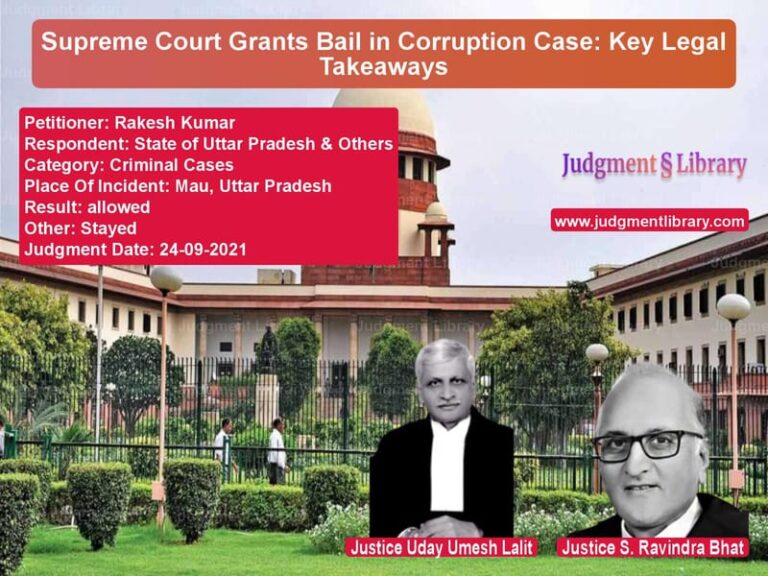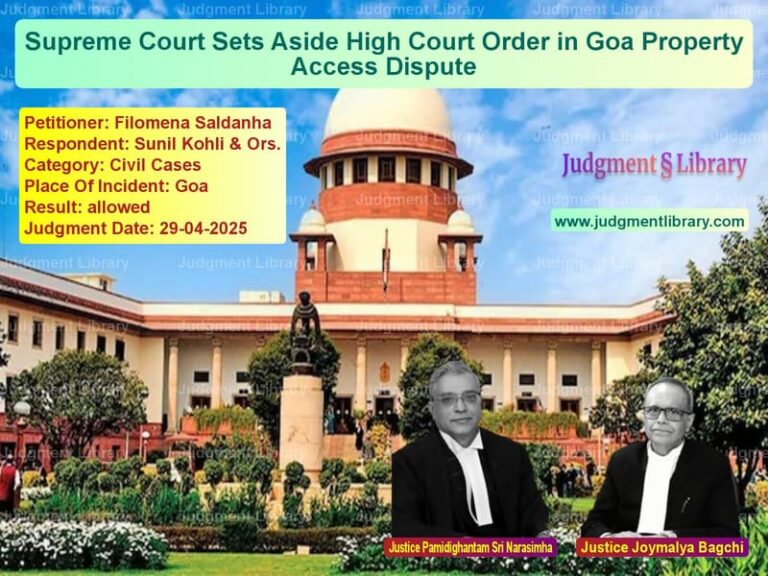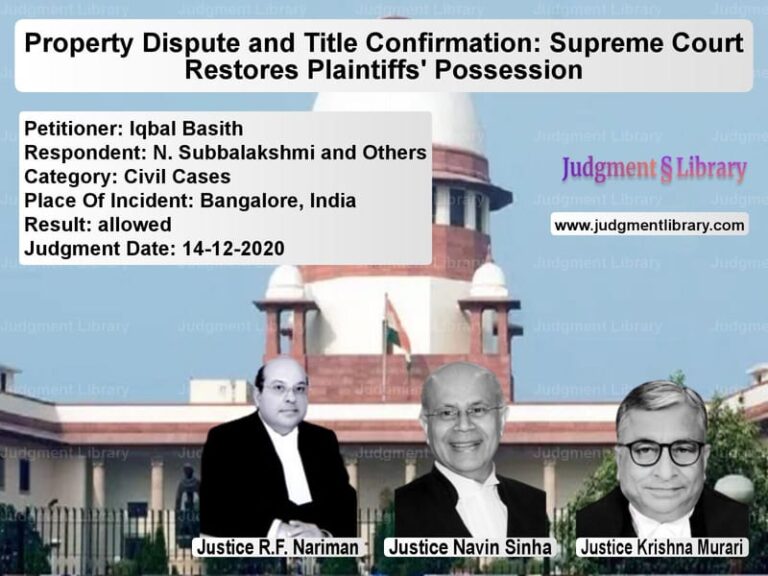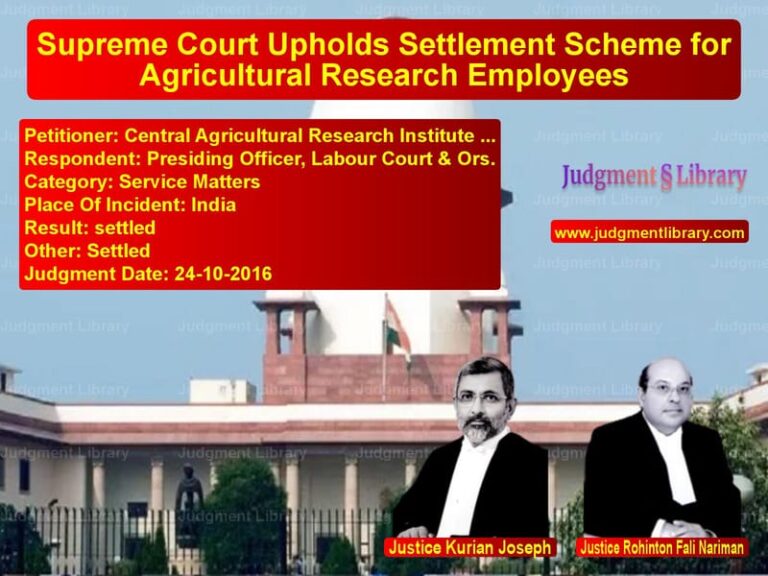Consumer Rights in Real Estate: Supreme Court Directs Refund for Homebuyers in Delayed Project
The Supreme Court of India in IREO Grace Realtech Pvt. Ltd. vs. Abhishek Khanna & Others addressed critical issues concerning homebuyers’ rights, builder obligations, and unfair trade practices in real estate projects. The judgment, delivered on January 11, 2021, upheld the National Consumer Disputes Redressal Commission’s (NCDRC) order, directing the developer to refund homebuyers due to inordinate construction delays.
Background of the Case
The case involved multiple homebuyers who had booked apartments in the housing project “The Corridors” in Gurgaon, Haryana. The developer, IREO Grace Realtech Pvt. Ltd., had promised possession within 42 months from the sanction of building plans, with an additional six-month grace period. However, possession was not offered even after several years, prompting homebuyers to seek legal recourse.
The National Commission ruled in favor of the buyers, ordering a refund with interest. Aggrieved by this order, the developer approached the Supreme Court.
Key Legal Issues Addressed
1. Whether the Date for Possession Should Be Calculated from Fire NOC Approval
The developer argued that the 42-month timeline should start from the date of fire safety clearance (November 27, 2014), rather than the date of building plan approval (July 23, 2013). The homebuyers contended that the delay in obtaining fire clearance was the developer’s fault and should not impact the timeline.
2. Whether the Apartment Buyer’s Agreement Contained Unfair Terms
The agreement imposed severe penalties on buyers for delayed payments but provided inadequate compensation for construction delays. Homebuyers argued that the clauses were one-sided and constituted unfair trade practices.
3. Whether Homebuyers Had the Right to Terminate the Agreement
Buyers who had waited several years for possession sought the right to terminate the agreement and claim refunds. The developer argued that homebuyers should accept delayed possession instead.
4. Whether the Consumer Protection Act Overrode RERA
The developer contended that disputes should be handled under the Real Estate (Regulation and Development) Act (RERA), rather than the Consumer Protection Act, 1986. The homebuyers argued that they were entitled to consumer remedies, including refund and compensation.
Findings of the Court
1. Possession Timeline Should Begin from Fire NOC Approval
The Supreme Court ruled that since fire clearance was a statutory prerequisite for construction, the timeline for possession should commence from the date of fire NOC approval (November 27, 2014). Consequently, the possession deadline was extended to November 27, 2018, plus a six-month grace period.
2. Apartment Buyer’s Agreement Contained Unfair Clauses
The Court noted that the agreement imposed stringent penalties on buyers but offered inadequate compensation for delays. It ruled that such one-sided clauses constituted an unfair trade practice under the Consumer Protection Act.
3. Homebuyers Had the Right to Terminate and Seek Refunds
For buyers whose apartments were still incomplete, the Court ruled they were entitled to a full refund with interest. For those offered possession after delays, they had the option to either accept possession with compensation or seek a refund.
4. Consumer Protection Act Provides an Additional Remedy to RERA
The Court reaffirmed that homebuyers could seek relief under the Consumer Protection Act, as its provisions were in addition to RERA, and did not bar consumer complaints.
Supreme Court’s Verdict
- Buyers in completed towers had the option to take possession with compensation for delay.
- Buyers in incomplete towers were entitled to a full refund with 9% annual interest.
- The developer could not impose arbitrary deductions from the refund amount.
- Refunds had to be processed within three months, failing which interest would increase to 12% per annum.
Conclusion
This landmark ruling reinforces the rights of homebuyers and ensures accountability in real estate projects. The judgment underscores that:
- Developers must adhere to contractual timelines and cannot unilaterally alter delivery schedules.
- Unfair clauses in builder-buyer agreements are unenforceable.
- Homebuyers have the right to refunds and compensation for delays.
- Consumer laws provide an independent and effective remedy alongside RERA.
The Supreme Court’s decision ensures greater protection for homebuyers and sets a precedent against unfair trade practices in the real estate sector.
Petitioner Name: IREO Grace Realtech Pvt. Ltd..Respondent Name: Abhishek Khanna & Others.Judgment By: Justice Dhananjaya Y Chandrachud, Justice Indu Malhotra, Justice Indira Banerjee.Place Of Incident: Gurgaon, Haryana.Judgment Date: 11-01-2021.
Don’t miss out on the full details! Download the complete judgment in PDF format below and gain valuable insights instantly!
Download Judgment: ireo-grace-realtech-vs-abhishek-khanna-&-ot-supreme-court-of-india-judgment-dated-11-01-2021.pdf
Directly Download Judgment: Directly download this Judgment
See all petitions in Contract Disputes
See all petitions in Consumer Rights
See all petitions in Judgment by Dhananjaya Y Chandrachud
See all petitions in Judgment by Indu Malhotra
See all petitions in Judgment by Indira Banerjee
See all petitions in dismissed
See all petitions in supreme court of India judgments January 2021
See all petitions in 2021 judgments
See all posts in Civil Cases Category
See all allowed petitions in Civil Cases Category
See all Dismissed petitions in Civil Cases Category
See all partially allowed petitions in Civil Cases Category







